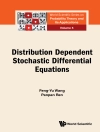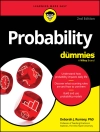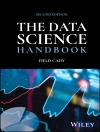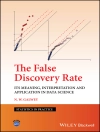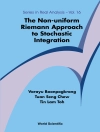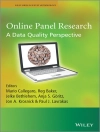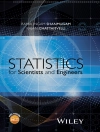A comprehensive and accessible presentation of probability
and stochastic processes with emphasis on key theoretical concepts
and real-world applications
With a sophisticated approach, Probability and Stochastic
Processes successfully balances theory and applications in a
pedagogical and accessible format. The book’s primary focus
is on key theoretical notions in probability to provide a
foundation for understanding concepts and examples related to
stochastic processes.
Organized into two main sections, the book begins by developing
probability theory with topical coverage on probability measure;
random variables; integration theory; product spaces, conditional
distribution, and conditional expectations; and limit theorems. The
second part explores stochastic processes and related concepts
including the Poisson process, renewal processes, Markov chains,
semi-Markov processes, martingales, and Brownian motion. Featuring
a logical combination of traditional and complex theories as well
as practices, Probability and Stochastic Processes also
includes:
* Multiple examples from disciplines such as business,
mathematical finance, and engineering
* Chapter-by-chapter exercises and examples to allow readers to
test their comprehension of the presented material
* A rigorous treatment of all probability and stochastic
processes concepts
An appropriate textbook for probability and stochastic processes
courses at the upper-undergraduate and graduate level in
mathematics, business, and electrical engineering, Probability
and Stochastic Processes is also an ideal reference for
researchers and practitioners in the fields of mathematics,
engineering, and finance.
สารบัญ
List of Figures xvii
List of Tables xxi
Preface i
Acknowledgments iii
Introduction 1
PART I PROBABILITY
1 Elements of Probability Measure 3
1.1 Probability Spaces 4
1.2 Conditional Probability 16
1.3 Independence 23
1.4 Monotone Convergence properties of probability 25
1.5 Lebesgue measure on the unit interval (0, 1] 31
Problems 34
2 Random Variables 39
2.1 Discrete and Continuous Random Variables 42
2.2 Examples of commonly encountered Random Variables 46
2.3 Existence of random variables with prescribed distribution. Skorohod representation of a random variable 59
2.4 Independence 62
2.5 Functions of random variables. Calculating distributions 66
Problems 76
3 Applied chapter: Generating Random Variables 81
3.1 Generating one dimensional random variables by inverting the CDF 82
3.2 Generating one dimensional normal random variables 85
3.3 Generating random variables. Rejection sampling method 88
3.4 Generating random variables. Importance sampling 104
Problems 113
4 Integration Theory 117
4.1 Integral of measurable functions 118
4.2 Expectations 124
4.3 Moments of a random variable. Variance and the correlation coefficient. 137
4.4 Functions of random variables. The Transport Formula. 139
4.5 Applications. Exercises in probability reasoning. 142
4.6 A Basic Central Limit Theorem: The De Moivre-Laplace Theorem: 144
Problems 146
5 Conditional Distribution and Conditional Expectation 149
5.1 Product Spaces 150
5.2 Conditional distribution and expectation. Calculation in simple cases 154
5.3 Conditional expectation. General definition 157
5.4 Random Vectors. Moments and distributions 160
Problems 169
6 Moment Generating Function. Characteristic Function. 173
6.1 Sums of Random Variables. Convolutions 173
6.2 Generating Functions and Applications 174
6.3 Moment generating function 180
6.4 Characteristic function 184
6.5 Inversion and Continuity Theorems 191
6.6 Stable Distributions. Lévy Distribution 196
Problems 200
7 Limit Theorems 205
7.1 Types of Convergence 205
7.2 Relationships between types of convergence 213
7.3 Continuous mapping theorem. Joint convergence. Slutsky’s theorem 222
7.4 The two big limit theorem: LLN and CLT 224
7.5 Extensions of CLT 237
7.6 Exchanging the order of limits and expectations 243
Problems 244
8 Statistical Inference 251
8.1 The classical problems in statistics 251
8.2 Parameter Estimation problem 252
8.3 Maximum Likelihood Estimation Method 257
8.4 The Method of Moments 268
8.5 Testing, The likelihood ratio test 269
8.6 Confidence Sets 276
Problems 278
PART II STOCHASTIC PROCESSES
9 Introduction to Stochastic Processes 285
9.1 General characteristics of Stochastic processes 286
9.2 A Simple process? The Bernoulli process 293
Problems 296
10 The Poisson process 299
10.1 Definitions. 299
10.2 Interarrival and waiting time for a Poisson process 302
10.3 General Poisson Processes 309
10.4 Simulation techniques. Constructing Poisson Processes 315
Problems 318
11 Renewal Processes 323
11.1 Limit Theorems for the renewal process 326
11.2 Discrete Renewal Theory. 335
11.3 The Key Renewal Theorem 340
11.4 Applications of the Renewal Theorems 342
11.5 Special cases of renewal processes 344
11.6 The renewal Equation 350
11.7 Age dependent Branching processes 354
Problems 357
12 Markov Chains 361
12.1 Basic concepts for Markov Chains 361
12.2 Simple Random Walk on integers in d-dimensions 373
12.3 Limit Theorems 376
12.4 States in a MC. Stationary Distribution 377
12.5 Other issues: Graphs, first step analysis 384
12.6 A general treatment of the Markov Chains 385
Problems 395
13 Semi-Markov and Continuous time Markov Processes 401
13.1 Characterization Theorems for the general semi Markov process 403
13.2 Continuous time Markov Processes 407
13.3 The Kolmogorov Differential Equations 410
13.4 Calculating transition probabilities for a Markov process. General Approach 415
13.5 Limiting Probabilities for the Continuous time Markov Chain 416
13.6 Reversible Markov process 419
Problems 422
14 Martingales 427
14.1 Definition and examples 428
14.2 Martingales and Markov chains 430
14.3 Previsible process. The Martingale transform 432
14.4 Stopping time. Stopped process 434
14.5 Classical examples of Martingale reasoning 439
14.6 Convergence theorems. L1 convergence. Bounded martingales in L2 446
Problems 448
15 Brownian Motion 455
15.1 History 455
15.2 Definition 457
15.3 Properties of Brownian motion 461
15.4 Simulating Brownian motions 470
Problems 471
16 Stochastic Differential Equations 475
16.1 The construction of the stochastic integral 477
16.2 Properties of the stochastic integral 484
16.3 Ito lemma 485
16.4 Stochastic Differential equations. SDE’s 489
16.5 Examples of SDE’s 492
16.6 Linear systems of SDE’s 503
16.7 A simple relationship between SDE’s and PDE’s 505
16.8 Monte Carlo Simulations of SDE’s 507
Problems 512
A Appendix: Linear Algebra and solving difference equations and systems of differential equations 517
A.1 Solving difference equations with constant coefficients 518
A.2 Generalized matrix inverse and pseudodeterminant 519
A.3 Connection between systems of differential equations and matrices520
A.4 Linear Algebra results 523
A.5 Finding fundamental solution of the homogeneous system 526
A.6 The nonhomogeneous system 528
A.7 Solving systems when P is nonconstant 530
Index 533
เกี่ยวกับผู้แต่ง
Ionut Florescu, Ph D, is Research Associate Professor of Financial Engineering and Director of the Hanlon Financial Systems Lab at Stevens Institute of Technology. His areas of research interest include stochastic volatility, stochastic partial differential equations, Monte Carlo methods, and numerical methods for stochastic processes. He is also the coauthor of Handbook of Probability and coeditor of Handbook of Modeling High-Frequency Data in Finance, both published by Wiley.





